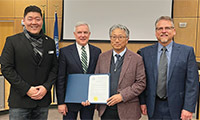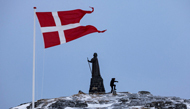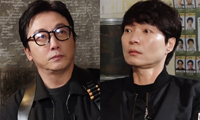Every day is Thanksgiving Day for me.
I give thanks and praise to God for the gift of life, for this great nation, where we can practice our faith, speak and write and enjoy opportunities, such as this that bring civic minded people together to support a worthy cause-your public library. It is my privilege and joy to share my journey from the Land of Morning Calm, an old name for Korea.
Sometimes, as I scurry about sprawling Los Angeles, gathering information for the articles that I write for the Los Angeles Times, I feel as if I’m observing the life of someone else.
How is it possible that, I, a refugee from North Korea who came so close to death half a dozen times even before starting elementary school end up in America, making a living as a newspaper woman in a language that is not my own? Those of you, fortunate enough to call English your native tongue may not appreciate it, but English is the most difficult language to learn for East Asians.
L’s and R’s twisted my tongue. Syntax made no sense to me. Grammar was impossible. As soon as I learned the rules, I would have to learn all the exceptions. Trying to write in English was a nightmare.
And, yet, the challenge of learning English engaged me, and I, like my father before me, fell in love with the language of Shakespeare, Wordsworth and T.S. Eliot.
Though by nature, I am an introvert, better suited to be a research librarian-preferably in the stacks-I pursued a career that required me to get out of my shell and talk to people of all types and at all times.
When I take time to look back, as I did in preparing for my talk, I cannot help but be profoundly moved by the wonderment of God’s manifold handiwork in my life. That I am alive and functioning, after what I’ve been through, is a miracle.
I have worked for seven American newspapers and news agencies from California to New York, and several Asian publications across the Pacific.
Mine has been a demanding, but exhilarating journey. I can’t imagine having another job that would engage me as much as this one. I consider mine a calling. I am privileged to be an observer, an interpreter, a translator and an analyst in this laboratory called Los Angeles, where people of more than 100 ethnicities and languages live, sometimes in mind-soaring celebration of our diversity but also at times in heart-wrenching discord that can make cynics out of even the most idealists of us.
Let us never give up; the cause is worthwhile. We can be gifts to each other by getting to know each other, being sensitive to where we come from but also focused on where we are going. Our shared humanity can transcend our differences.
My journey from the ancestral home on the northern tip of the rabbit-shaped Korean peninsula to Los Angeles in the closing days of the 20th century, was a meandering oneÑwith many stops along the way.
I have had many up and downs. I have gone through garbage cans in search of food and I have enjoyed stretches of material comfort.
As I look back, I see God’s imprint in everything- from the harrowing escape across the 38th parallel for freedom in the south, to surviving the bombings during the Korean War when people were dropping like flies all around me, the terrifying train ride on the rooftop of the last train out of Seoul to stay a step ahead of the oncoming Communists, and an escape on a tiny fishing boat on a stormy sea to Japan, where I was captured with my mother as illegal aliens.
I became an inmate at the age of nine. In jail, I befriended tough-looking men with tatoos on their arms, who, despite their hardened exterior, were kind to me and told me, that they, too, were fathers with little girls like me at home. I was a jail mascot.
Much to my mother’s horror, I learned to play cards from my fellow inmates and one of the first Japanese words I learned was irezumi-meaning tattoo. My cellmate was a prostitute with smoldering eyes and eyelids painted in green. She, too, was kind to me, offering me a half of loaf of bread, when I walked into the cell with my mother.
They are part of the mosaic of my life. I see their faces on the canvas of my mind as clear as if I saw them yesterday.
From the jail, we were relocated to a detention center for illegal aliens. From the detention center, we moved to a hospital where my mother was treated for several weeks.
Finally set free on bail in the fall of 1952, my mother and I joined my father in Tokyo, where he was working at General Douglas MacArthur’s Far East Command.
I quickly plunged into learning Japanese, then English. Japanese, being another Asian language, was easy, but English was excruciating.
I wanted to be a writer since I was seven and once I began to learn English, it seemed to me that I should try to write in my new language.
But try as I might, I could find no role models of Korean women writing in English. So I looked for people to emulate in non-Koreans such as Pearl Buck (whom I would interview many years later in Seoul, of all places) and Marguerite Higgins of the New York Herald Tribune, the famous foreign correspondent who had covered the Korean War.
By the time I was a high school sophomore and working on my school paper, I was certain I wanted to be a newspaperwoman.
When I learned that the School of Journalism at the University of Missouri was the world’s oldest and the finest, I applied and was admitted.
The only problem was I did not have a passport to travel to America. The Japanese government had given us a special permanent residency status (as refugees), but it could not issue me a passport since I was a Korean national.
And the dictatorial government of Syngman Rhee punished people it didn’t like by holding back on passports. Then, the most unexpected thing happened. South Korean students, fed up with Rhee’s tyrannical rule, rose up in mass demonstrations, toppling his government.
The new government under U.S.-educated John Chang, a Roman Catholic, issued me a passport. Soon I was on my way to America, on a big Pan Am jet, scared but brimming with hope of starting a new chapter in my life. That was September, 1961.
San Francisco was my first stop on the mainland, and I loved it from the moment I set my eyes on it. Little did I know then that San Francisco would become my adoptive home and I would spend most of my adult life there.
While a student at the School of Journalism, I worked at a local newspaper. I marveled at American democracy in action as I covered school board meetings and county court sessions. I loved the way Americans did their public business in public-debating late into the night. And, I fell in love all over again with the English pronoun you-the ultimate equalizer.
After graduation, I went on to Medill School of Journalism at Northwestern University, earned a master’s degree, and promptly got my first paying job in the summer of 1964 in Rochester, N.Y. There, I was the lone Asian not only at the newspaper but in many places I frequented. Whenever I went out on assignments, people wanted to know, where did I come from? How did I get into journalism? I was a curiosity. I had so many invitations to dinners, concerts and parties, I felt like a socialite.
Not bad for a North Korean refugee, I thought as I juggled my busy social calendar.
My encounter with America changed my life. It opened my eyes to a world where people made choices based on their individual preferences. America gave me with a new set of eyes to judge my own culture and value systems. My contact with America sparked an internal revolution that continues to this day.
Concepts that Americans take for granted, such as egalitarianism, justice, and fairness, gradually became part of my own value system.
I have come to believe as strongly as anyone else in the inherent equality of all people-a concept foreign in my Confucian-steeped culture.
I have come to believe in fairness, the rule of law, and the importance of rules and process-all alien concepts where I came from. But the encounter with America has been a mixed blessing: I have been enriched by it, and I have suffered because of it. To decide where I belonged -here or across the Pacific-I went back and forth. Twice I returned to work in Asia, first as a young reporter, then later as a foreign correspondent.
However, assimilated I might feel at times, and however much my profession and my acculturation pull me into mainstream America, I identify with immigrants because I am one of them.
I have brought to America memories of my ancestral land, memories not only of the clear rivers and breathtaking mountains but also memories of poverty. I have the indelible scars in my psyches of the Korean War, the partition that still keeps ll million Koreans separated from their relatives...and the three decades of South Korean military rule during which we were unable to speak our minds even from here for fear of retribution to loved ones back home.
Even in Los Angeles today, Koreans often end their gatherings with a song that I learned as a child: Its refrain goes like this: "Our wish is reunification; even in our dreams, our wish is reunification."
It breaks my heart that the Korean peninsula remains divided, long after the Soviet Union is gone and that millions of my sisters and brothers in North Korea are dying of starvation.
We Koreans are not as well known as the Chinese and Japanese, but we have been in the United States since the dawn of the 20th century-working in the sugarcane fields in Hawaii, picking oranges in Riverside, and growing rice in the Sacramento Valley. Often mistaken for Chinese or Japanese, Koreans have worked hard, dreaming of the day they would return to their country when it would be free from foreign domination.
The Korean diaspora began with critical decisions President Theodore Roosevelt made in 1905. In a secret treaty with Japan, he agreed to give Japan control over Korea and Manchuria in exchange for Japan’s promise not to interfere with the U.S. presence in the Philippines.
Continuing foreign intervention over the next five decades has inextricably altered not only the course of my life and that of my family, but the lives of 75 million ethnic Koreans everywhere.
It was the direct result of Roosevelt’s decision that led a number of my ancestors to leave home to help wage the independence movement in Manchuria, China and Russia. My paternal grandfather sacrificed his life to free Korea. Captured by the Japanese police and imprisoned twice during which he was tortured mercilessly, my grandfather was a broken man in body and spirit when he was released from prison the second time.
Many nights he was heard singing the Korean national anthem in his sleep.
It has been quite a journey for this North Korean refugee. I continue the mental gymnastics of accommodating several cultures in me-moving back and forth in these often conflicting worlds. My conclusion is that Korea, Japan and America are all part of me and that my identity is wrapped up in all. When some of the difficulties in my life to which I alluded earlier, seem too much, I turn to these words of Oswald Chambers:
"The river of the Spirit of God overcomes all obstacles. Never focus your eyes on the obstacle or the difficulty. The obstacle will be a matter of total indifference to the river that will flow steadily through you if you will simply remember to stay focused on the Source."
We are on this pilgrimage for a reason. Our challenge is to rise to the occasion-to invest in people, help carry each other’s burdens and share our talents, time and resources. Let us count our blessings and give thanks. To God be the glory.
(K. Connie Kang is a reporter at the Los Angeles Times and author of ÒHome Was the Land of Morning Calm: A Saga of a Korean-American Family.)
스마터리빙
more [ 건강]
[ 건강]이제 혈관 건강도 챙기자!
[현대해운]우리 눈에 보이지 않기 때문에 혈관 건강을 챙기는 것은 결코 쉽지 않은데요. 여러분은 혈관 건강을 유지하기 위해 어떤 노력을 하시나요?
 [ 건강]
[ 건강]내 몸이 건강해지는 과일궁합
 [ 라이프]
[ 라이프]벌레야 물럿거라! 천연 해충제 만들기
 [ 건강]
[ 건강]혈압 낮추는데 좋은 식품
[현대해운]혈관 건강은 주로 노화가 진행되면서 지켜야 할 문제라고 인식되어 왔습니다. 최근 생활 패턴과 식생활의 변화로 혈관의 노화 진행이 빨라지고
사람·사람들
more
[한인단체 신년 인터뷰] LA 평통 장병우 회장… “본연 역할로 한반도 평화 실질 기여”
민주평화통일자문회의 LA협의회(이하 LA 평통) 장병우 회장은 6일 본보와의 신년 인터뷰에서 붉은 말의 해인 병오년 새해를 맞아 신년 화두로 …

워싱턴주에 첫 한인 시의장
워싱턴주에서 첫 한인 시의회 의장이 탄생했다. 제이슨 문(한국명 문태원) 머킬티오 시의원이 새해 들어 시의장으로 선출되며 또 하나의 중책을 맡…
국회 방문단 대한인국민회 방문
윤후덕·이해식·김한규 의원과 조오섭 국회의장 비서실장 등 10여 명의 한국 국회방문단이 지난 5일 LA를 찾아 로즈데일 묘지와 국민회관 등 미…
[한인단체 신년 인터뷰] 명원식 파바월드 회장… …
“한인 차세대들이 바르게 자랄 수 있는 토대를 만드는 것이 제가 파바월드의 회장으로 존재하는 유일한 이유입니다”한인사회의 대표적 청소년 봉사 …
LA한인회 멘토 프로그램 10일 스티브 강 위원장
LA 한인회(회장 로버트 안)가 한인사회 차세대 인재양성 노력의 하나로 ‘멘토를 만나다’ 프로그램을 정례화해 실시하고 있는 가운데 그 세 번째…
많이 본 기사
- 머스크, 韓인구절벽 또 경고… “북한군 그냥 걸어 넘어오면 돼”
- 구글 공동창업자도 오라클 회장도…탈캘리포니아?
- 덴마크·그린란드, 美 ‘그린란드 회담’ 수락에 “환영”
- 연예계 은퇴합니다..돌연 충격 선언한 조윤우·소희·이태임
- 트럼프, ‘美 베네수 운영 관여 1년 넘나’ 묻자 “훨씬 더 길 것”
- 젤렌스키 “美 우크라 안전보장안, 트럼프 결정만 남아”
- ICE 요원 총격… 시민권자 여성 사… 4
- [스키 기고] 초보자의 수난과 고수의 허세
- “공업용 실리콘을 얼굴에”..故 선풍기 아줌마, 충격적인 성형 부작용[꼬꼬무]
- 내란특검, 尹 구형 숙고 6시간 ‘마라톤 회의’…키는 조은석 손에
- 탁재훈·신정환, 드디어 컨츄리꼬꼬 재회.. “또 잡힌 겁니까?”[노빠꾸]
- 트럼프 관세에 美 무역적자 16년만에 최소…의약품 수입 금감
- 초강경 이민단속, 아시아계도 큰 타격 3
- ‘美 정복’ 손흥민, 케인·메시·음바페와 어깨 나란히... ‘올해의 팀’ 공격수 부문 후보 등극
- 美, 인천에 본부 둔 녹색기후기금 탈퇴… “자금지원 안해”
- ICE Agent Shooting Sparks Outrage: U.S. Citizen Woman Killed
- 케빈 김 주한 미 대사대리 전격 이임
- ‘오타니·야마모토’ 때문에 日 못 뚫는 SF, ‘이정후 파워’로 한국 개척 나선다... 일본도 주목 중
- 유엔기후협약, 美 탈퇴에 “자책골…재가입문 열려있어”
- 초강경 이민단속, 아시안 커뮤니티도 큰 타격
- 이주자 텍사스 몰린다 가주는 유입자 최하위
- 팰팍 타운 77만달러 적자 놓고 정치권‘충돌’
- ‘데이트 폭력 폭로’ 재키와이, 돌연 입 열었다 “흉기·스토킹 NO”
- 美, ‘외국산 드론·부품 수입 금지’ 예외 허용…삼성 제품 포함
- 軍권력기관 방첩사, 계엄 여파로 49년 만에 역사 속으로
- 李대통령 “에너지 문제로 국제 혼란…에너지대전환 잘 준비해야”
- [발언대] L.A. 갈비의 유래
- 브로드웨이 뮤지컬 공연을 반값에…
- “모든 소송 철회하고 내분사태 원만히 해결하길”
- 마크롱 “美, 일부 동맹국에 등 돌리고 국제규범서 벗어나”
- 부고-박철환 씨 별세
- LAX 무인열차 6월엔 개통되나
- 뉴욕 등 5개주 연방아동보육예산 지원 전격 중단
- 제5대 회장에 김길영 회장 연임
- “주택 부족, 워싱턴 경제 위험 초래”
- 42억 횡령→징역형 집유 받았는데도..황정음 소속사 여전히 미등록
- D-SNP 한인 가입자들, 그로서리 혜택 놓친다
- 가주 등 5개주 연방 아동보육 예산 전격 동결
- MD 몽고메리서 음주운전자 140여명 적발
- ‘故안재환과 사별’ 정선희, 재혼 질문에 솔직 답변 “국내에선 의향 없어”
- 韓 여야, 이혜훈 청문회 19일 하루 잠정 합의… “충분히 질의”
- 2026년은?
- 한인 제이슨 문, 머킬티오 시의장됐다...5일 첫 회의 주재한 가운데 ‘한인의 날’지지 선언문 채택
- 형제교회 올해도 1만달러 ...꿈나눔북클럽 2,000달러, 시애틀진보연대 500달러
- ‘연방 하원 민주·상원 공화’가능성 커
- [신년 집중기획/ 변모하는 한인타운] K-컬처 중심으로… 면모·체질 ‘업그레이드’ 원년
- [독자 투고] 땅 끝 마을 파타고니아… 2
- 아펜젤러 한국선교 140주년 기념 미주 순회공연
- ‘맥립’에 갈비고기 없다 맥도널드 허위광고 소송
- LA 한인회, 새해 맞아 양로병원 어르신들께 ‘새배’
1/5지식톡

-
 미 육군 사관학교 West Poin…
0
미 육군 사관학교 West Poin…
0https://youtu.be/SxD8cEhNV6Q연락처:wpkapca@gmail.comJohn Choi: 714-716-6414West Point 합격증을 받으셨나요?미 육군사관학교 West Point 학부모 모…
-
 ☝️해외에서도 가능한 한국어 선생님…
0
☝️해외에서도 가능한 한국어 선생님…
0이 영상 하나면 충분합니다!♥️상담신청문의♥️☝️ 문의 폭주로 '선착순 상담'만 진행합니다.☎️ : 02-6213-9094✨카카오톡ID : @GOODEDU77 (@골뱅이 꼭 붙여주셔야합니다…
-
 테슬라 자동차 시트커버 장착
0
테슬라 자동차 시트커버 장착
0테슬라 시트커버, 사놓고 아직 못 씌우셨죠?장착이 생각보다 쉽지 않습니다.20년 경력 전문가에게 맡기세요 — 깔끔하고 딱 맞게 장착해드립니다!장착비용:앞좌석: $40뒷좌석: $60앞·뒷좌석 …
-
 식당용 부탄가스
0
식당용 부탄가스
0식당용 부탄가스 홀세일 합니다 로스앤젤레스 다운타운 픽업 가능 안녕 하세요?강아지 & 고양이 모든 애완동물 / 반려동물 식품 & 모든 애완동물/반려동물 관련 제품들 전문적으로 홀세일/취급하는 회사 입니다 100% …
-
 ACSL 국제 컴퓨터 과학 대회, …
0
ACSL 국제 컴퓨터 과학 대회, …
0웹사이트 : www.eduspot.co.kr 카카오톡 상담하기 : https://pf.kakao.com/_BEQWxb블로그 : https://blog.naver.com/eduspotmain안녕하세요, 에듀스팟입니다…
케이타운 1번가
오피니언
 이상희 UC 리버사이드 교수 인류학
이상희 UC 리버사이드 교수 인류학 오렌지 상자와 함께하는 2026년
 오세정 서울대 물리천문학부 명예교수·전 총장
오세정 서울대 물리천문학부 명예교수·전 총장 [오세정 칼럼] 병오년 새해, 한국의 과제
 존 안 / LA 거주
존 안 / LA 거주 [독자 투고] 땅 끝 마을 파타고니아 여행 유감
 이리나 수필가
이리나 수필가 [윌셔에서] 레디 코어(Ready Core)의 해를 맞으며
 이영창 / 한국일보 논설위원
이영창 / 한국일보 논설위원 [지평선] 67년생 현역 축구선수 미우라

[왈가 왈부] “이혜훈 청문회까지 지켜봐야”… 국민 눈높이에 맞나요
 정숙희 논설위원
정숙희 논설위원케네디에 관한 네 개의 이야기
 마크 A. 시쎈 / 워싱턴포스트 칼럼니스트
마크 A. 시쎈 / 워싱턴포스트 칼럼니스트 [마크 A. 시쎈 칼럼] 트럼프의 20가지 업적
 김동찬 시민참여센터 대표
김동찬 시민참여센터 대표 [미국은 지금] 2026년 ‘손님’ 의식 버리고 ‘주인’ 입장을
1/3지사별 뉴스

팰팍 타운 77만달러 적자 놓고 정치권‘충돌’
뉴저지 팰리세이즈팍 타운정부가 지난해 77만5,000달러 재정적자가 발생한 것을 두고 정치권이 강하게 충돌하면서 지역 한인사회가 술렁이고 있다…
뉴욕 등 5개주 연방아동보육예산 지원 전격 중단

‘연방 하원 민주·상원 공화’가능성 커
올해 11월3일 미 전역에서 중간선거가 실시된다. 이번 선거에서는 연방 하원 전체 435석과 함께 연방 상원 100석 가운데 35석을 새로 선…
“주택 부족, 워싱턴 경제 위험 초래”

베네수 이어 그린란드…트럼프, 2년차 벽두부터 美우선주의 거친 질주
2026년 새해 벽두부터 도널드 트럼프 대통령의 행보가 심상치 않다.집권 2기 2년차를 맞아 자신과 지지층의 이념이라 할 ‘미국 우선주의’ 구…
중부 캘리포니아 ‘한인 이민사’ 나왔다

오늘 하루 이 창 열지 않음 닫기 


















































.png)


댓글 안에 당신의 성숙함도 담아 주세요.
'오늘의 한마디'는 기사에 대하여 자신의 생각을 말하고 남의 생각을 들으며 서로 다양한 의견을 나누는 공간입니다. 그러나 간혹 불건전한 내용을 올리시는 분들이 계셔서 건전한 인터넷문화 정착을 위해 아래와 같은 운영원칙을 적용합니다.
자체 모니터링을 통해 아래에 해당하는 내용이 포함된 댓글이 발견되면 예고없이 삭제 조치를 하겠습니다.
불건전한 댓글을 올리거나, 이름에 비속어 및 상대방의 불쾌감을 주는 단어를 사용, 유명인 또는 특정 일반인을 사칭하는 경우 이용에 대한 차단 제재를 받을 수 있습니다. 차단될 경우, 일주일간 댓글을 달수 없게 됩니다.
명예훼손, 개인정보 유출, 욕설 등 법률에 위반되는 댓글은 관계 법령에 의거 민형사상 처벌을 받을 수 있으니 이용에 주의를 부탁드립니다.
Close
x